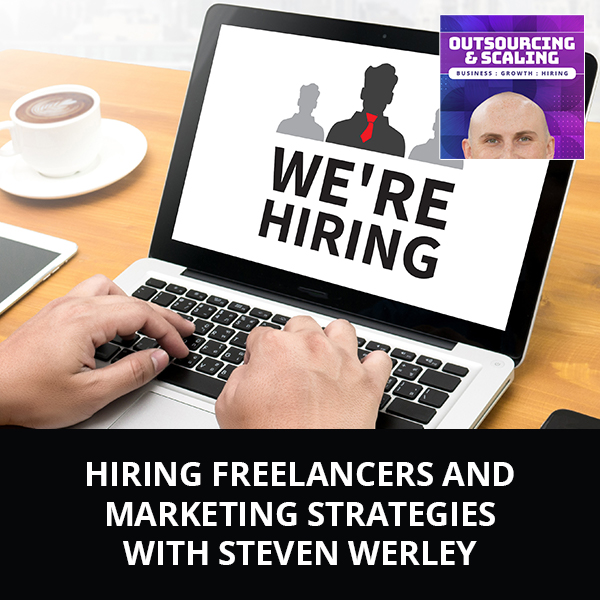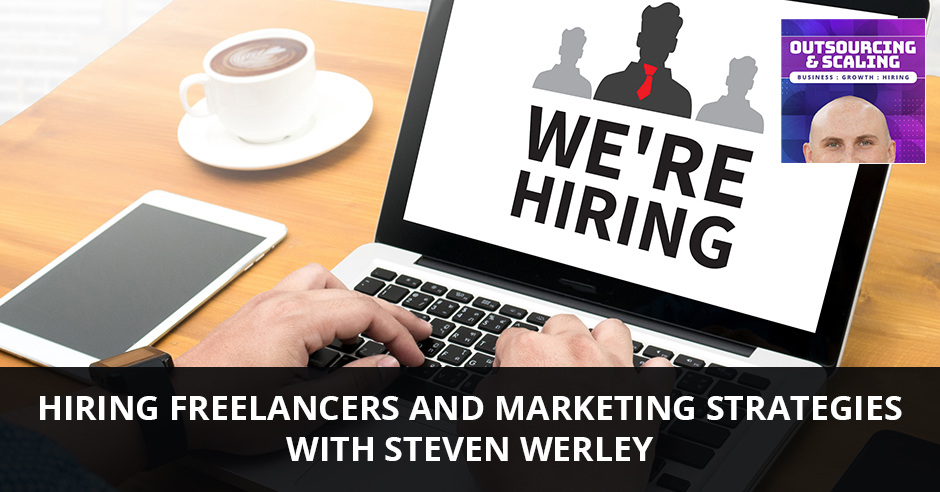


Hiring people can be a tough decision especially when you’re a first times business owner. It could lead to your success or to your downfall. Nathan Hirsch talk with digital marketer and former Army Ranger Steven Werley about the first time he hired freelancers for his business and the lessons he learned from it. He opens up about how the experience taught him to change his pace and shares some tips for marketing agencies that are using different freelancers and virtual assistants to change how they’re dealing with clients for the better. He also dives into marketing and shares his insights on the things he’s seeing in the marketing community.
—
Listen to the podcast here:
[smart_track_player url=”https://www.podetize.com/statsapi/www.podetize.com/wp-content/uploads/fileuploads/11-5b145ef137b51b3d1af0633e9305c43d/11/2019/df5cad3f86c178ee69004456acd7c59c.mp3″ title=”Hiring Freelancers And Marketing Strategies With Steven Werley” artist=”Nathan Hirsch” image=”https://freeup.net/wp-content/uploads/2019/04/OAS.png” ]
Download the audio file here.
Hiring Freelancers And Marketing Strategies With Steven Werley
My guest is Steven Werley. Steven, how are you doing?
I’m good. How are you, Nathan?
I’m doing great. Steve is a digital marketer, a former Army Ranger and a proud father. He works with businesses to increase their visibility and develop custom marketing campaigns based on their market and industry. He uses freelancers to do that. We’re going to talk all about that. Let’s take a gigantic step back. What were you like growing up? Were you a straight-A student? Were you a rebel? Did you know you wanted to be an entrepreneur? Because you are an Army Ranger, I’m assuming that you were straight edge at some point.
It’s funny thinking back that far. Ultimately my sister was the straight-A student, not me. I was more of the B, sometimes C student. My parents were both teachers, so they hated when I wasn’t a straight-A student. I was more of a goody two-shoes growing up who went to college. I was majoring in Computer Science. I was frustrated in that structured learning environment. I hated it because I was always teaching myself coding from scratch on my own. I always told my parents when I was younger that I was going to work from home one day, that’s what I’m going to do. I even have this Facebook post from when I was younger in high school. It was many years ago, but it always pops up in my memories. I told my mom that I’m going to have a better life than her and I’m going to work from home. Sure enough, it came back around.
What made you go into the Army, to begin with? What was that experience like? What did it teach you out and how did those lessons apply to being an entrepreneur?
I’ve been a runner my whole life. Athletics has always been important to me. I like lifting and running a lot. I like doing a lot of endurance-based things. My frustration in Computer Science and in college led me to finish this degree as soon as possible. I knew I wasn’t going to get out of college without finishing my degree unless I was making insane money. I wasn’t trying to do anything crazy. I ultimately decided to load up my schedule. I graduate in three and a half years and I had delayed enlistment to go into the Army in which my goal was to do spec ops. I made sure I have the right contacts so I could go to ranger selection.

What was that like?
It was a big change of pace. The first thing is I was already through college. A lot of the guys going in are only eighteen. Seeing a couple of more years walk a life and not always living with my mom and having her give me anything, helped me out significantly in that. Because you could see the eighteen-year-old had issues like Drill Sergeants yelling on their face, but as you move through, you get used to it. There are rules to follow. There are a lot of regulations in the military, the chain of command. You see some of those things translated in the business. Some of the businesses try to stay away from those more or less depending on what their culture is like. Even in the military, a lot of your commanders have open-door policies. You usually don’t need to use them for anything but if something serious comes up, you could. It’s intense when you’re a low rank. There’s a lot to get used to and following rules. You get kicked down in the dirt. Ultimately, it was a big learning experience. I had great leaders throughout it though. My one team leader, I still keep in contact with. He has a business and he’s out as well. It all comes full circle.
Getting out of the Army, going back into real life or civilian, what was that like? Was that an adjustment? I feel like different people go through that at a different level.
I had this unfortunate ending to my military career. I passed out one time. We all thought it was a joke because I locked my knees out. It happened a couple more times. We were not able to explain what happened. I wanted to stay in, but the issue was I couldn’t because they couldn’t even explain what happened. I was at risk then. The last few months were a lot more relaxed for me. I was still in my unit. Being in a ranger regiment is a high-intensity unit. The task I was doing was a little bit different and they wouldn’t let me work out at all. If I were to get injured or something I would be liable and I could get in big trouble for that. I had to be low key. Transitioning out then was a lot more simple for me, plus I already had a college degree, so I wasn’t super worried about anything specifically. I was trying to line stuff up and I was working on getting my Master’s degree in internet marketing, which was probably not the best use of my GI Bill, but I did it nonetheless.
What was that like coming back and why go into entrepreneurship?
I had a daughter and I moved back to PA temporarily. I reconnected with one of my friends from college who got a work from home job doing some different coding stuff. I ultimately decided to work there. It’s a super small company, less than ten people and had a morning up meeting. This application had no documentation outside of what was on the website itself. It’s called Appian. It’s a business process modeling system. This company would get big contracts with different companies. You could think of Mercedes or others trying to automate tasks. A lot of what we do in the marketing world, it’s weird thinking some of the stuff I do and how they do it. It’s all custom and coded in this program versus what I do, it almost doesn’t even make sense to me anymore.
Running an agency takes a lot of clarity. You need to understand who you want to serve and how to serve them on the right level.
I hated it because I couldn’t learn. It was shifting back from this coding landscape and they weren’t helping very much, they were busy. Without any books, courses and documentation outside of what the website provided, it sucked. I was helping my mom’s nonprofit. I did a website for them and it popped to my head. I’m like, “I can do this full-time.” I started teaching myself HTML when I was in eighth-grade. Working on WordPress is easy for me to be able to build out and design websites. That’s how it all started. I joined a networking group. I started taking on local clients, working with local businesses and started out as purely web design. It highly transformed since then.
What was that first year like getting that business off the ground? I feel like the first year is that make or break. Were you going through it alone or did you start hiring people right away or did that come down the line?
I was completely alone in the beginning and it was highly stressful. I was doing okay and right as a servant to get better, my ex-wife and I decided to move, which was a one-way decision. We decided to move seven hours to the south of where I’m living, which is Southern Virginia and the economy here is poor. Even if you can get local clients here, people are charging $500 normally for a website. To sustain it is insane. I like doing custom high-end websites for my clients. That wasn’t working. I could show these people all the value in the world. It started to come around and I’ve been down here for a couple of years, but it’s so old school. It was very hard to obtain clients. What I did was I started to shift from that web design mindset and I started to learn more of the marketing techniques.
I was still doing this on my own. I wasn’t educated in the outsourcing world at that time, freelancers. I was honing my skills in different marketing techniques, working on funnel building, custom strategy. I got into a more like marketing automation. As I took on some more remote clients, eventually some more local clients came in from Danville. I decided to start to shift and I came across you and I started to learn more about the whole freelancer community. That first job that I eventually use was an internal job for a funnel I was working on for myself to obtain clients. It’s this four-video series that need to be edited. I’m not a video editor. I’m like, “I need somebody to do this.” That was my first step into the whole freelancer community.
What did you learn? Your first time hiring freelancers, did you make any mistakes? Did it teach you things that you should do the next time you hire?
I didn’t know what questions to ask initially whatsoever. The first freelancer I hired was a bust. Everything I was saying wasn’t properly being translated, first of all. Second of all, there is a big quality issue that I was noticing too. I was like, “I need to do someone else.” I didn’t write it off. I knew that this was my first time in it. I brought on this second person. I asked some different questions based on more experience type of things and the types of jobs that they had already done. I was able to see more work that they had previously done as well and that was a much better fit. I’ve since used them on some different projects as well. That’s been a good resource. I’m happy that it was an internal thing for me. It was my own money on the line and not charging a client and expecting that money to be profit for myself right away. I was already looking at it as an investment. It worked out well. I do use freelancers for clients as well.
Do you have them interact with the client? Are you the client-facing person, you’re handing off the work and you’re doing the quality assurance and all that?
I’m the client-facing person. I don’t think that’s something that’s going to change. What I’ve liked to do at some point in 2020 would be to bring on someone who’s more like a partner to myself and be able to do more customer interaction. I can do a lot of the bigger strategy pieces. I can manage a lot of the freelancers and the dirty work behind it all and getting these campaigns working. That’s the ultimate plan in the next couple of years.

What tips do you have for marketing agencies that are using different freelancers and virtual assistants that might change dealing with clients? What do you tell clients? Are you transparent about it? Are you not? Do you do act like they are a team?
I act like they are part of the team. That is the safest way to go about it from what I’ve seen so far. If I’m like, “I’m taking your work and I’m giving it to this freelancer.” When you say that you’re failing to communicate what’s happening. The client at that point would probably feel something potentially unethical is happening and that’s not the case. What we’re trying to do at least from my perspective, I can’t speak for all the agencies. I try and service the customer at the highest possible level. I don’t outsource web design.
I haven’t been comfortable enough to fully delve into that. I would need to set up my own process for checks and balances if I were to do that. It’s on the table but I haven’t done it yet. Ultimately, this client needs help with their website and a lot of what they’re going to get revenue from is having an SEO strategy. If I have someone on for SEO, they’re part of my team. The thing is, I’m so working with that person directly, I’m so managing them. It’s no different than if I have internal contractors. This helps keep costs down. It’s a business decision.
Ultimately, for the customer, they’re still getting the highest level of output that we can provide. That’s the important piece. The same that I use all these freelancers and I outsource to different countries. It comes across a lot different. There are some business owners who already do some of these things, but you see that more in the mortgage loan or real estate community, based on how they prospect. For a marketing agency and working with a lot of the businesses that I work with, which are small businesses, they probably wouldn’t understand at the same level.
What do you see happening in the marketing community? Where do you think things are going in terms of working with clients, getting leads and converting them?
Are you saying more from a strategy standpoint?
Yes, what do you see that’s working?
What I do is I try and work with my clients and I like working with small brick and mortar businesses. A lot of people are like, “I want to work with these bigger eCommerce brands. They can pay me $5,000 a month for managing their ads.” I like working with small local businesses. It’s how I started. I can build more personal connections with them. What I like doing is taking them through a process. In that process, I have two separate strategies. I can give you a document. I’ve started working on this. It’s called the Local Domination Roadmap.
I’ve always done it with clients, but I’ve created an actual document. The idea of it is that there are foundational and growth strategies. Inside the foundational strategies, we have stuff like having a website, having a Google My Business listing, being able to have your Facebook and Instagram pages set up properly, having your Facebook page on your website. One of the things that a lot of people are missing tend to be with the reviews and reputation. That’s one of my big flagships early on products because that helps increase word of mouth referrals and then you moved to growth.
The review section of your website helps increase word of mouth referrals and move you to growth.
The overall strategy is what a lot of different people are missing. A lot of times you’ll have a customer contact you and they’re like, “I want a website.” You automatically are like, “Let’s do the website.” There’s no real plan for ascension. There’s no real meaning behind it. I find that a lot of people asking for website don’t actually want a website. They want the benefits of a website if they were paying to drive traffic to it or if they were paying to have an ad strategy behind it, but they don’t. That website sits there and collects dust and they don’t build any revenue from it.
That makes a lot of sense. Where do you see people go wrong when it goes to their marketing strategy outside of what you talked about?
A lot of times, businesses feel that they can just watch a quick video or figure out how to do it and it’s an easy industry to work around. Maybe it’s because of the building of all the courses that are out there. Someone could go and take a course for $1,000 or $2,000 and they can be the best bot marketer in the world. Information is everywhere. It’s easier to learn this stuff more than it’s ever been. One, there’s a huge trust issue with marketers. Two, they feel like they can implement this strategy themselves and then they get caught up in that. They’re like, “I’m going to do the social media posting. I’m going to post once a day or once every other day.” Whatever it is that small businesses try and do. It’s usually a lot less than the national brands.
They still fall significantly short of that because they say they’re too busy with their customers. They’re too busy with clients, but then they still say they have a revenue issue at the end of the day. To answer your question in short, it’s lacking that overall strategy and being able to build trust with someone to do that. My first meeting is always very educational. It’s always based on what do you have. These are the types of strategies we suggest. Even if you want a website, we suggest not going that route right now. Even if it doesn’t make me as much money in the short run because I can usually retain them. I can make way more money from them in the long run and make them more profit.
Anything else you want to share with the audience? It could be about marketing, it could be about hiring.
When it comes to having an agency, it takes a lot of clarity. I started my business a few years ago and I think it a few years to figure out that clarity. The niching down thing isn’t what I’m trying to get at, because I’m not the best person at niching down. I have a niche but it’s still pretty broad ultimately. It works well for me. Understanding in general, who do you want to serve and then how do we serve them on the right level? Is there some process? Not everybody falls into the same process. It has to be fluid and flexible. I didn’t have that. It was always, “Someone wants a website, let’s do it.” I collect a little monthly payment from them for hosting. That doesn’t add up much revenue in the long run. Shift your perspective into figuring out an actual plan to guide people through value profit ladder and move them through that process to be able to get them more business ultimately. That can help you ascend, build trust and also help increase your referrals as well.
Where can people find out more about you and what are you most excited about for the rest of the year?
You can definitely find more about me at StevenWerley.com. It’s pretty simple. I have a Facebook page, which is Steven E. Werley. You can connect with me on LinkedIn if you search for me. My Instagram is @SteveWerley. For the rest of 2019, the guide that I’m going to give you, I’m going to continue building that out and make it much bigger than it is. What I’m doing is I’m excited to continue to show people a lot of the different reputation stuff that I work on. When it comes to freelancers, I’m working on some more broad national SEO people and then also some local. In 2020, I’m going to try and tackle the whole web design thing and see how that goes.
Thanks so much for coming on. I’m sure we’ll be in touch.
Thanks, Nathan.
Important Links:
- Steven Werley
- Local Domination Roadmap
- StevenWerley.com
- Steven E. Werley – Facebook page
- LinkedIn – Steven Werley Consulting
- @SteveWerley – Instagram page
- Appian
About Steven Werley
 Steven Werley is a digital marketer, former Army Ranger, and proud father.
Steven Werley is a digital marketer, former Army Ranger, and proud father.
He works with businesses to increase their visibility and develop custom marketing campaigns based on their market and industry.
